
Journal Menu
► ▼ Journal Menu-
- Energies Home
- Aims & Scope
- Editorial Board
- Reviewer Board
- Topical Advisory Panel
- Instructions for Authors
- Special Issues
- Topics
- Sections & Collections
- Article Processing Charge
- Indexing & Archiving
- Editor’s Choice Articles
- Most Cited & Viewed
- Journal Statistics
- Journal History
- Journal Awards
- Society Collaborations
- Conferences
- Editorial Office
Journal Browser
► ▼ Journal BrowserNeed Help?
Announcements
29 September 2025
World Architecture Day—“Design for Strength”, 6 October 2025
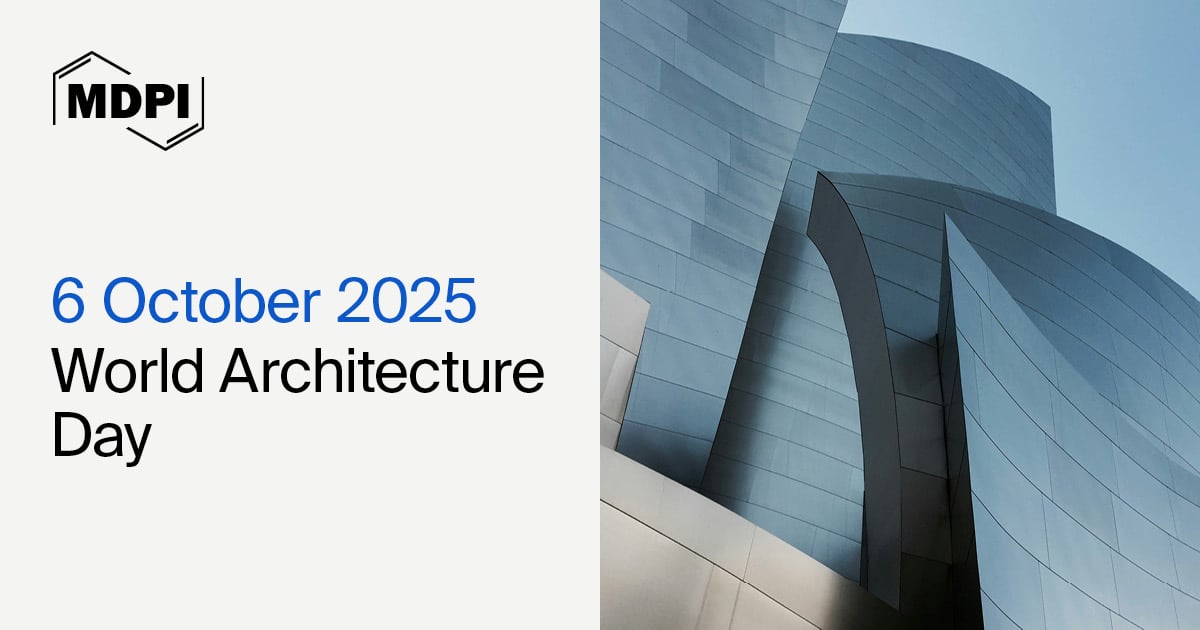
World Architecture Day, observed annually on the first Monday of October, is a global initiative that highlights the critical role of architecture in addressing societal challenges while promoting sustainable and equitable development of built environments. Established by the International Union of Architects (UIA) in 1985, this day has become a vital platform for advancing architectural innovation and raising public awareness about the transformative power of design.
Aligned with the 2025 theme, “Design for Strength”, and Goal 11 of the UN Sustainable Development Goals (Sustainable Cities and Communities), MDPI emphasizes the need for resilient, adaptive, and inclusive architectural solutions. In an era of rapid urbanization and climate uncertainty, architects and researchers are pioneering groundbreaking approaches—from disaster-resistant structures to carbon-neutral materials—that fundamentally redefine how we build and inhabit spaces.
Join us in celebrating World Architecture Day and supporting initiatives that empower architects to create a more sustainable and resilient future. Together, we can shape built environments that not only withstand the tests of time and transformation but also foster equity, well-being, and harmony between humanity and nature.

|
Engineering |
Chemistry & Materials Science |
Environment & Earth Sciences |

Invited Speakers:
 |
 |
 |
 |
|
Prof. Dr. Derek Clements-Croome, |
Dr. Paris Fokaides, |
Dr. Ehsan Harirchian, |
Prof. Dr. Umberto Berardi, |
Free to register for this webinar here!

We are honored to interview Dr. Paris Fokaides from Frederick University, Cyprus, on his research journey and insight.
 |
Name: Dr. Paris Fokaides “Academic work on ‘design for strength’ must integrate performance simulations, life cycle thinking, and smart readiness assessments to ensure designs are not only safe and durable, but also sustainable and responsive.” Please read the full interview here. |

“Comparison of Pulse-Echo Tomography and Through-Transmission Ultrasonic Test for UPV Characterization of Building Materials”
by Emilia Vasanelli, Davide Di Gennaro, Matteo Sticchi, Gianni Blasi and Luigi Capozzoli
Infrastructures 2025, 10(7), 162; https://doi.org/10.3390/infrastructures10070162
“An Ontology-Aided Generative Computational Design Process for Ecological Building Envelopes: Development of a Conceptual Framework for the Early Design Stage”
by Michael Hensel, Jakub Tyc, Albin Ahmeti and Defne Sunguroğlu Hensel
Land 2025, 14(4), 840; https://doi.org/10.3390/land14040840
“AI-Driven Innovations in Building Energy Management Systems: A Review of Potential Applications and Energy Savings”
by Dalia Mohammed Talat Ebrahim Ali, Violeta Motuzienė and Rasa Džiugaitė-Tumėnienė
Energies 2024, 17(17), 4277; https://doi.org/10.3390/en17174277
“Application of Long-Period Fiber Grating Sensors in Structural Health Monitoring: A Review”
by Ying Zhuo, Pengfei Ma, Pu Jiao and Xinzhe Yuan
CivilEng 2024, 5(3), 559–575; https://doi.org/10.3390/civileng5030030
“Recycling Potential of Construction Materials: A Comparative Approach”
by Matan Mayer
Constr. Mater. 2024, 4(1), 238–250; https://doi.org/10.3390/constrmater4010013
“A New Method for Defining the Optimal Separation Gap Distance and the Acceptable Structural Pounding Risk on Multistory RC Structures”
by Maria G. Flenga and Maria J. Favvata
Appl. Sci. 2024, 14(3), 1165; https://doi.org/10.3390/app14031165
“A Simple and Effective Method to Evaluate Seismic Maximum Floor Velocities for Steel-Framed Structures with Supplementary Dampers”
by Alexia Kosmidou, Foteini Konstandakopoulou, Nikos Pnevmatikos, Panagiotis G. Asteris and George Hatzigeorgiou
Appl. Mech. 2023, 4(4), 1114–1126; https://doi.org/10.3390/applmech4040057
“Effects of Chemicals Exposure on the Durability of Geopolymer Concrete Incorporated with Silica Fumes and Nano-Sized Silica at Varying Curing Temperatures”
by Sagar Paruthi, Ibadur Rahman, Asif Husain, Mohd Abul Hasan and Afzal Husain Khan
Materials 2023, 16(18), 6332; https://doi.org/10.3390/ma16186332
“Innovative and Sustainable Composite Material for the Seismic and Energetic Upgrade of Historic Masonry Buildings”
by Dora Pugliese, Valerio Alecci, Rosa Romano, Gianfranco Stipo, Mario De Stefano and Antonio Nanni
Fibers 2023, 11(9), 76; https://doi.org/10.3390/fib11090076
“Evaluation of the Performance and Durability of Self-Cleaning Treatments Based on TiO2 Nanoparticles Applied to Cement-Based Renders and Boards”
by Alberto Fregni, Luca Venturi and Elisa Franzoni
Coatings 2023, 13(6), 990; https://doi.org/10.3390/coatings13060990
“Predicting Energy Consumption in Residential Buildings Using Advanced Machine Learning Algorithms”
by Fateme Dinmohammadi, Yuxuan Han and Mahmood Shafiee
Energies 2023, 16(9), 3748; https://doi.org/10.3390/en16093748
“Key Building Design and Construction Lessons from the 2023 Türkiye–Syria Earthquakes”
by Iftekhar Ahmed
Architecture 2023, 3(1), 104–106; https://doi.org/10.3390/architecture3010007

|
“Resilience and Sustainability in Architecture and Urban Planning: Policies, Practices, Strategies and Visions, 2nd Edition” |
“BioCognitive Architectural Design” |
 |
 |
|
“Incorporating Advanced New or Recycled Materials in Reinforced Concrete Structures” |
“Mineral and Metal Materials in Civil Engineering” |
 |
 |
29 September 2025
Energies Best Paper Award—Winning Papers Announced
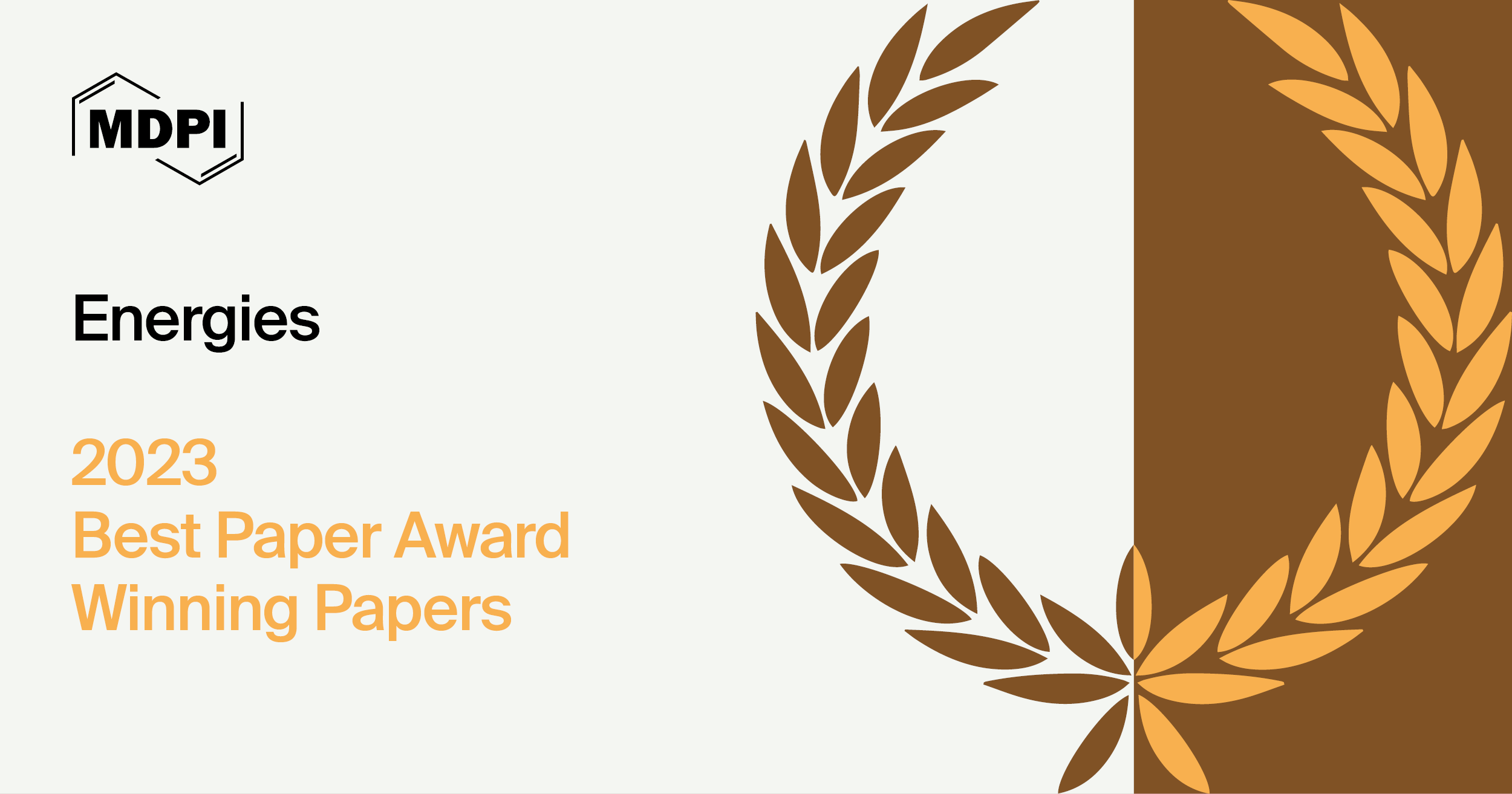
The editorial team of Energies (ISSN: 1996-1073) would like to congratulate the winners of the Energies 2023 Best Paper Award, who were chosen by a selection committee chaired by the Editor-in-Chief, Prof. Dr. Enrico Sciubba. Following a review process by the Award Evaluation Committee, four reviews and nine article papers were selected as winners. The recipients are as follows:
Review Papers:
1. “Virtual Power Plant with Renewable Energy Sources and Energy Storage Systems for Sustainable Power Grid-Formation, Control Techniques and Demand Response”
by Jiaqi Liu, Hongji Hu, Samson S. Yu and Hieu Trinh
Energies 2023, 16(9), 3705; https://doi.org/10.3390/en16093705
Available online: https://www.mdpi.com/1996-1073/16/9/3705
2. “Review and Comparison of Genetic Algorithm and Particle Swarm Optimization in the Optimal Power Flow Problem”
by Georgios Papazoglou and Pandelis Biskas
Energies 2023, 16(3), 1152; https://doi.org/10.3390/en16031152
Available online: https://www.mdpi.com/1996-1073/16/3/1152
3. “A Review of Hydroponics and Conventional Agriculture Based on Energy and Water Consumption, Environmental Impact, and Land Use”
by Dimitra I. Pomoni, Maria K. Koukou, Michail Gr. Vrachopoulos and Labros Vasiliadis
Energies 2023, 16(4), 1690; https://doi.org/10.3390/en16041690
Available online: https://www.mdpi.com/1996-1073/16/4/1690
4. “A Global Review of the Hydrogen Energy Eco-System”
by Omer Faruk Noyan, Muhammad Mahmudul Hasan and Nezih Pala
Energies 2023, 16(3), 1484; https://doi.org/10.3390/en16031484
Available online: https://www.mdpi.com/1996-1073/16/3/1484
Article Papers:
1. “Assessing Fossil Fuels and Renewables’ Impact on Energy Poverty Conditions in Europe”
by George Halkos and Eleni-Christina Gkampoura
Energies 2023, 16(1), 560; https://doi.org/10.3390/en16010560
Available online: https://www.mdpi.com/1996-1073/16/1/560
2. “The Impact of the 2020–2022 Crises on EU Countries’ Independence from Energy Imports, Particularly from Russia”
by Tomasz Rokicki, Piotr Bórawski and András Szeberényi
Energies 2023, 16(18), 6629; https://doi.org/10.3390/en16186629
Available online: https://www.mdpi.com/1996-1073/16/18/6629
3. “Liquid Water Characteristics in the Compressed Gradient Porosity Gas Diffusion Layer of Proton Exchange Membrane Fuel Cells Using the Lattice Boltzmann Method”
by Song Yan, Mingyang Yang, Chuanyu Sun and Sichuan Xu
Energies 2023, 16(16), 6010; https://doi.org/10.3390/en16166010
Available online: https://www.mdpi.com/1996-1073/16/16/6010
4. “Energy Behaviors of Prosumers in Example of Polish Households”
by Bożena Gajdzik, Magdalena Jaciow, Radosław Wolniak, Robert Wolny and Wieslaw Wes Grebski
Energies 2023, 16(7), 3186; https://doi.org/10.3390/en16073186
Available online: https://www.mdpi.com/1996-1073/16/7/3186
5. “Predicting Energy Consumption in Residential Buildings Using Advanced Machine Learning Algorithms”
by Fateme Dinmohammadi, Yuxuan Han and Mahmood Shafiee
Energies 2023, 16(9), 3748; https://doi.org/10.3390/en16093748
Available online: https://www.mdpi.com/1996-1073/16/9/3748
6. “Energy Consumption of Electric Vehicles: Analysis of Selected Parameters Based on Created Database”
by Maksymilian Mądziel and Tiziana Campisi
Energies 2023, 16(3), 1437; https://doi.org/10.3390/en16031437
Available online: https://www.mdpi.com/1996-1073/16/3/1437
7. “Evolution of CCUS Technologies Using LDA Topic Model and Derwent Patent Data”
by Liangchao Huang, Zhengmeng Hou, Yanli Fang, Jianhua Liu and Tianle Shi
Energies 2023, 16(6), 2556; https://doi.org/10.3390/en16062556
Available online: https://www.mdpi.com/1996-1073/16/6/2556
8. “Forecasting Energy Consumption of a Public Building Using Transformer and Support Vector Regression”
by Junhui Huang and Sakdirat Kaewunruen
Energies 2023, 16(2), 966; https://doi.org/10.3390/en16020966
Available online: https://www.mdpi.com/1996-1073/16/2/966
9. “Electric Vehicle User Behavior: An Analysis of Charging Station Utilization in Canada”
by Tim Jonas, Noah Daniels and Gretchen Macht
Energies 2023, 16(4), 1592; https://doi.org/10.3390/en16041592
Available online: https://www.mdpi.com/1996-1073/16/4/1592
22 September 2025
World Architecture Day | Interview with Dr. Paris Fokaides, Frederick University, Cyprus
World Architecture Day (WAD), created by the International Union of Architects (UIA) in 1985, is celebrated annually on the first Monday of October. This day coincides with the United Nations World Habitat Day, aligning the architectural community’s efforts with global urban development goals. This year, under the theme “Design for Strength”, we were sincerely honored to interview Dr. Paris Fokaides, Editorial Board Member of Sustainability (ISSN: 2071-1050), Topical Advisory Panel Member of Energies (ISSN: 1996-1073), and Guest Editor of Buildings (ISSN: 2075-5309).
|
|
Name: Dr. Paris Fokaides |
The following is a short interview with Dr. Paris Fokaides:
1. Could you share a bit of your journey into architectural research?
My academic journey began in process engineering, where I focused on optimizing complex systems to improve efficiency, sustainability, and performance. During my PhD, my work centered on thermochemical processes, energy conversion, and the integration of sustainable technologies into industrial operations. Although my early career was firmly rooted in engineering, I became increasingly aware of how the same principles of optimization and resource efficiency could—and should—be applied to the built environment. Buildings, after all, are complex systems in themselves, with intricate interactions between materials, occupants, and environmental conditions. This realization marked the turning point that brought me into architectural research. I began collaborating with architects, building physicists, and urban planners to translate engineering methodologies into design strategies for sustainable buildings. Over time, my research shifted toward areas such as life cycle assessment (LCA), the Smart Readiness Indicator (SRI), renewable integration in buildings, and performance-based retrofitting approaches. What continues to inspire me is the interdisciplinary nature of this field: architectural research offers a unique arena where engineering precision, environmental stewardship, and human-centered design converge. My process engineering background provides the analytical rigor to evaluate performance, while my work in architecture connects those results to tangible design outcomes. This bridge between disciplines has allowed me to contribute to innovative solutions that are both technically sound and contextually sensitive—solutions that aim to make our built environment not just more efficient, but also healthier, more resilient, and more responsive to the needs of its users.
2. Could you please share the most impressive breakthrough in your research career, either in terms of ideas or research results?
The most significant breakthrough in my research career was leading to the development of the very first European standard on Smart Readiness Indicator (SRI) on-site assessments. As Chairman of the CEN Workshop Agreement (CEN WS Report), I had the privilege of guiding a diverse group of experts—ranging from policymakers and standardization specialists to researchers and industry stakeholders—in shaping a practical, harmonized approach for assessing building smartness in real operational contexts. Prior to this effort, the SRI was a promising concept at the EU level, but it lacked the concrete, field-based methodology needed for its effective implementation. Our work bridged that gap. We established clear procedures, assessment criteria, and reporting formats to ensure that SRI evaluations could be carried out consistently across different building types, climates, and national contexts. This standard was the first of its kind and set the foundation for integrating smartness into mainstream performance evaluations. For me, the breakthrough was not only the technical content but also the collaborative process—bringing together different perspectives and aligning them into a single, coherent framework. The resulting document is now a key reference for Member States as they move toward the large-scale adoption of SRI, helping translate policy goals into measurable and actionable outcomes. This experience reinforced my belief that impactful research is as much about building consensus and applicability as it is about technical innovation. It also demonstrated how academic leadership can shape tools with real-world policy and market implications.
3. How do you interpret the theme of “design for strength” from an academic perspective?
From an academic perspective, “design for strength” extends far beyond the traditional engineering notion of withstanding loads or resisting failure. In architecture and the built environment, strength is a multi-layered concept encompassing structural integrity, environmental resilience, social relevance, and long-term adaptability. Structurally, it refers to designing buildings and infrastructures that can safely bear intended loads, resist natural hazards, and maintain performance over their intended life cycle. However, when examined through the lens of sustainable architectural research, strength also involves the capacity of a design to adapt to changing conditions—climatic, technological, and societal—without losing functionality or value. In my research, I see “strength” as a product of synergy between engineering precision and human-centered design. A building may be physically robust, but if it fails to provide comfort, energy efficiency, and adaptability, its true strength is compromised. Therefore, academic work on “design for strength” must integrate performance simulations, life cycle thinking, and smart readiness assessments to ensure designs are not only safe and durable, but also sustainable and responsive. Strength can also be interpreted in terms of resilience—how well a building recovers from disruption, whether due to environmental events, energy system fluctuations, or changing user needs. In this sense, designing for strength is designing for continuity, ensuring that the built environment remains functional and relevant in the face of uncertainty. Ultimately, from an academic standpoint, “design for strength” is about uniting physical robustness with adaptability and sustainability, creating buildings that stand the test of both time and transformation.
4. Where do you see the future of architectural research?
The future of architectural research is moving toward a deeply integrated, interdisciplinary model where technology, sustainability, and human well-being converge. Historically, architecture has been perceived primarily as a creative and spatial discipline, while engineering and environmental sciences addressed performance and sustainability. This separation is dissolving. The buildings of the future will be conceived, designed, and operated as intelligent systems—able to adapt to climate conditions, interact with energy networks, and enhance occupant experience in real time. Digitalization will play a central role. The integration of Building Information Modeling (BIM) with real-time data from sensors, smart controls, and digital twins will allow researchers to simulate, test, and optimize building performance throughout its life cycle. Standardization—such as the Smart Readiness Indicator (SRI) framework I contributed to—will help ensure that these advancements are measurable and comparable across different contexts. Sustainability will remain a driving force, but the definition will expand to include circularity, biodiversity integration, and the social dimension of the built environment. Climate resilience will become a core research priority, especially in adapting buildings to extreme weather, energy volatility, and changing user needs. Collaboration between academia, industry, and policymakers will be critical. Research will increasingly need to produce tools and methodologies that are directly applicable in practice, influencing regulations and market adoption.
5. Do you have anything to say to your fellow scholars?
To my fellow scholars, I would say this: research in our field is not only about producing knowledge—it is about shaping the way people live, work, and interact with the built environment. We have the privilege, and the responsibility, to ensure that our contributions lead to spaces that are not just functional and aesthetically pleasing, but also sustainable, resilient, and inclusive. One of the greatest strengths we have as a community is our diversity of perspectives. Engineers, architects, social scientists, environmentalists, and policy experts all bring unique insights to the table. The most transformative solutions emerge when we allow these disciplines to interact freely and constructively. My own experience leading standardization work for the Smart Readiness Indicator has shown me the value of consensus-building—bringing together people from different backgrounds to create something meaningful and applicable beyond academia. I encourage colleagues to stay engaged not only with academic discourse but also with industry, policymakers, and communities. Our work gains relevance when it addresses real-world challenges and finds its way into practice, regulation, and everyday use. Finally, embrace curiosity and adaptability. The challenges of climate change, digital transformation, and societal shifts mean that our field will continue to evolve rapidly. New methods, tools, and even philosophies will emerge. By remaining open to learning and collaborating, we can ensure our research remains both rigorous and impactful—driving progress toward a built environment that serves both present and future generations.
6. As an Editorial Board Member of Sustainability, Topical Advisory Panel Member of Energies, and Guest Editor of Buildings, could you share your experience with MDPI journals?
Serving as an Editorial Board Member of Sustainability, a Topical Advisory Panel Member of Energies, and a Guest Editor of Buildings has given me a comprehensive perspective on the editorial process within MDPI journals. These roles have allowed me to engage with the research community from a different angle—evaluating submissions not only for their technical merit but also for their novelty, clarity, and potential impact. One aspect I particularly value about MDPI is the efficiency and transparency of its review process. The open access model ensures that high-quality research is freely available to both academics and practitioners, broadening the reach and potential influence of each publication. As an editor, I have witnessed how rapid but rigorous peer review can accelerate the dissemination of new findings without compromising quality.
My involvement has also deepened my appreciation for thematic Special Issues, which MDPI journals excel at organizing. These provide an excellent platform to cluster research efforts around emerging topics—whether in sustainable building design, smart readiness assessments, or advanced energy systems—helping to create coherent bodies of knowledge that can influence future research agendas. Equally rewarding is the interaction with authors and reviewers worldwide, which fosters a truly international exchange of ideas. This exposure to different academic cultures and approaches has been both enriching and inspiring. Overall, my MDPI experience has reinforced the importance of combining academic rigor with accessibility, ensuring that cutting-edge research serves the widest possible audience.
19 September 2025
Interview with Prof. Dr. Anastassios M. Stamatelos—Winner of the Energies Editor of Distinction Award
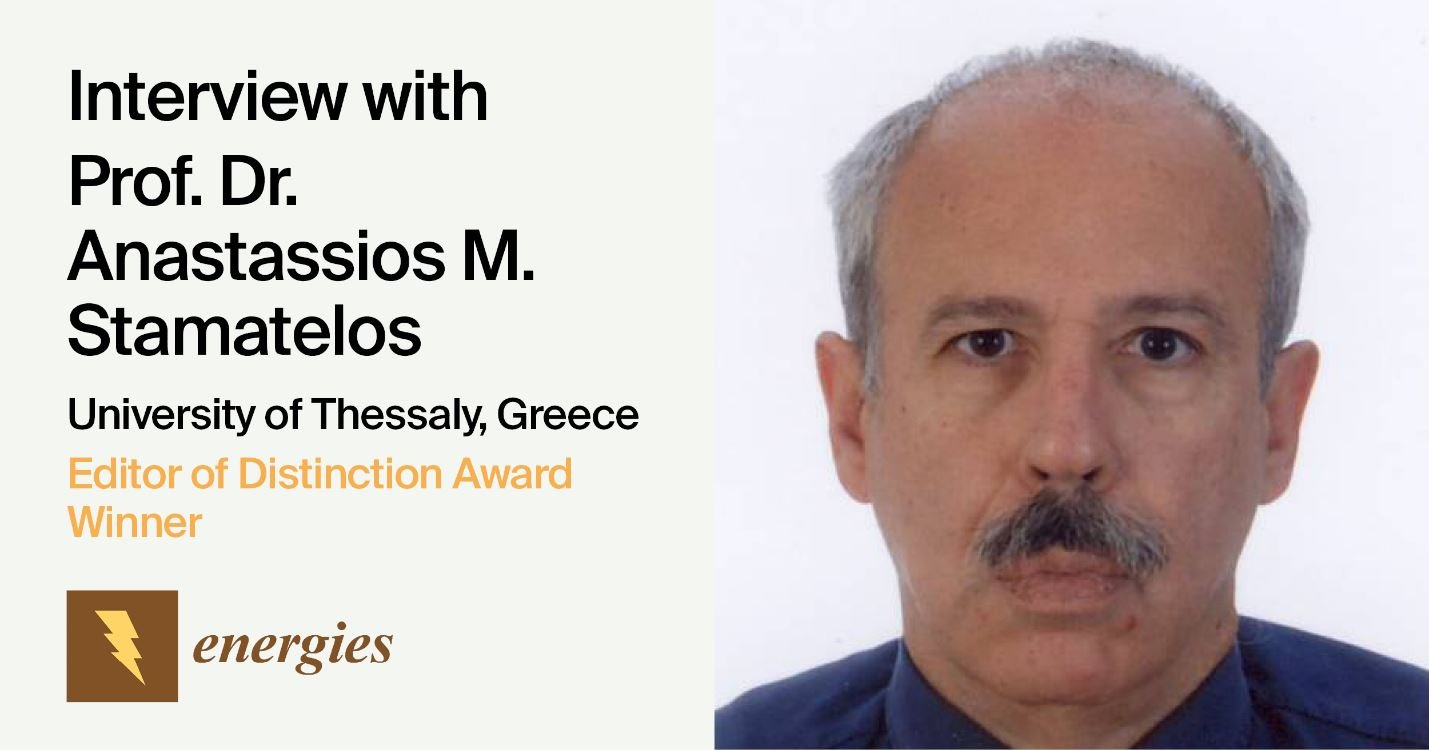
We are pleased to share with you a recent interview conducted with Prof. Dr. Anastassios M. Stamatelos, the winner of the Energies 2024 Editor of Distinction Award.
The following is an interview with Prof. Dr. Anastassios M. Stamatelos:
1. Could you give a brief introduction of yourself to the readers?
My name is Anastassios Stamatelos, and I am a Professor of mechanical engineering at the University of Thessaly in Greece. For the first two decades of my academic career, my research was primarily centered on applied thermodynamics and internal combustion engines, with particular emphasis on modeling and performance evaluation of engine systems and exhaust after-treatment technologies.
Over time, I broadened my research interests to encompass a wider range of energy-related topics, including energy systems simulation, control and performance optimization, real-world performance assessment, and forecasting of photovoltaic systems, and various solar energy applications. Our research group has also been active in the areas of building energy simulation, HVAC system modeling, and heat transfer applications involving infrared thermography.
Throughout my career, my work has consistently focused on applied research, integrating experimental investigation with advanced simulation techniques.
2. How was your experience being an editor for Energies?
Having previously published and reviewed for Energies, I was familiar with the journal’s editorial standards and scientific scope. Following repeated invitations, and being positively influenced by the feedback of my longtime friend and colleague, Prof. Rakopoulos from NTUA—who has served on the Editorial Board for many years—I accepted the invitation to join the Editorial Board. Given that my research focus aligns closely with the journal’s, it was a natural progression. It has been a rewarding experience to contribute to the academic community in this role, although I must note that the workload can be quite demanding at times.
3. Do you have any suggestions for improving our editorial process?
The main problem today with most journals is how to attract good reviewers who are able and willing to produce acceptable-quality reviews in a feasible period of time. Improving the journal’s reviewer database could help alleviate some of the editorial workload. This would reduce the total publishing cycle time, ultimately streamlining the review process and improving the overall efficiency of editorial operations.
Strengthening the Pre-Peer Review screening process, approximately 25% of all submissions could be rejected in the pre-peer review stage. This would save valuable time for our qualified reviewers and help enhance the overall quality of our published papers.
4. What motivated you to participate actively in the editorial process, and what do you find most rewarding about it?
When I decided to join the Editorial Board of Energies, I recognized that there was a clear need for a journal that could address the diverse and multidisciplinary nature of modern energy research and provide a platform for work that might not fit within the scope of more traditional journals in the field. In this context, I aimed at improving the journal’s publication procedures in the following directions: (i) Allow a fair and valid assessment of manuscripts summarizing important energy engineering achievements and innovative case studies that are difficult to publish in traditional journals in the field. (ii) Enhance the fast response and reduce the publishing cycle duration, with the selection of high-quality reviewers and removing under-qualified ones from the journal’s database. (iii) Strengthen the Pre-Peer Review screening process. This would save valuable time on our good reviewers and further increase the overall quality of our published papers. What I find most rewarding after serving for two and a half years in this post is a feeling of some progress in the above directions, and a steady improvement in the journal’s quality and status.
5. How do you manage your time and balance your responsibilities as a researcher and an editor?
This is something that is constantly changing because our job requirements as professors are changing. In the past, my workload was approximately equally distributed between teaching, research, and administration. The introduction of new technologies, along with the changing needs and learning styles of the current generation of students (Generation Z), presents unique challenges. Adapting our teaching methods to meet these needs requires considerable effort and time. This comes at a time when faculty staff are retiring, and replacements are not being made at the same rate, which in turn increases the teaching load.
At the same time, our aging experimental infrastructure demands more attention and maintenance. These factors combine to put significant strain on the time available for research, reviewing, and editorial responsibilities—traditionally taking up around 5–10% of our time.
Given these challenges, making the best use of the time available requires us to be highly efficient in managing our editorial duties.
6. How do you see the role of editors evolving with the advancements in artificial intelligence and automated tools in research?
Our work as teachers, researchers, and editors has already begun to feel the influence of artificial intelligence. However, its full impact is still unclear. The main challenge lies in integrating AI in a way that enhances our overall productivity without compromising the quality of our publications. The core issue remains ensuring the quality and validity of AI-generated outputs.
Integrating AI into the publishing pipeline could significantly improve efficiency. For example, AI could assist in the administration of our reviewer database: If our evaluations of each reviewer are processed through AI tools, we could systematically identify and remove unsuitable reviewers. This process could be guided by an automated technical report and evaluation generated by a specially designed AI tool.
7. In your opinion, which research topics will be of particular interest to the research community in the coming years?
In my area of focus, I think a research topic of particular interest is the general area of thermal management. This established field receives renewed interest due to the recent advancements in AI cloud computing and the electrification of vehicles. Many innovations in these areas are constrained by heat rejection and thermal management challenges, and the journal has already placed significant emphasis on this topic. Additionally, the evolving energy mix and the growing role of hydrogen will require the development of an infrastructure for its production, storage, transportation, and integration with electrical grids.
Lastly, multi-disciplinary research in energy systems holds great promise. This area requires collaboration across various engineering fields and other disciplines.
19 September 2025
Energies Accepted into ICI Journals Master List 2024
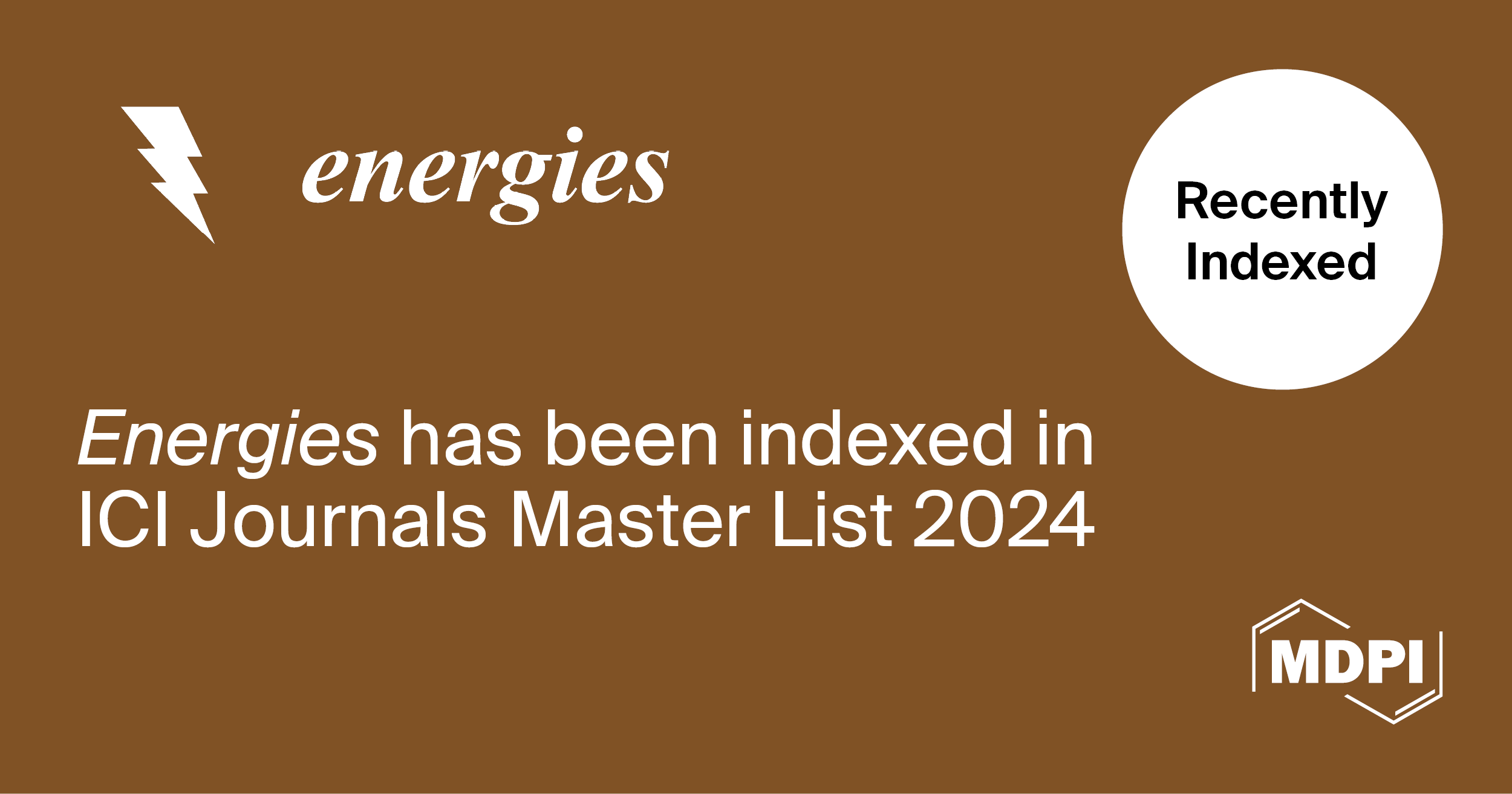
We are pleased to announce that Energies (ISSN: 1996-1073) has been accepted into the ICI Journals Master List 2024, receiving an MSHE scoring (provided by the Ministry of Science and Higher Education in Poland) of 140 pkt, as well as an Index Copernicus Value (ICV) 2024 of 177.50. The ICV index, valid for one year, aims to reflect the level of the journal’s development and its impact on the world of science.
The ICI Journals Master List is an international indexing database of scientific journals that has been evaluating the submitted periodicals for almost 20 years. The condition for being indexed in the database is passing a positive multidimensional evaluation which is based on over 100 criteria. The process of evaluation is free of charge, and it is available for every journal that is registered in the ICI World of Journals database.
We would like to express our sincere gratitude to our editors. We also acknowledge that this achievement would not have been possible without the many valuable publications of our authors and the contributions of our dedicated reviewers. We wish to thank you all for your support and hope to receive more contributions from you in the future.
In addition to ICI Journals Master List, Energies is also indexed within Scopus, SCIE (Web of Science), Ei Compendex, ANVUR, and other databases.
For more journal statistics, please visit https://www.mdpi.com/journal/energies/stats.
Energies Editorial Office
12 September 2025
Energies 2025 Best PhD Thesis Award—Open for Applications
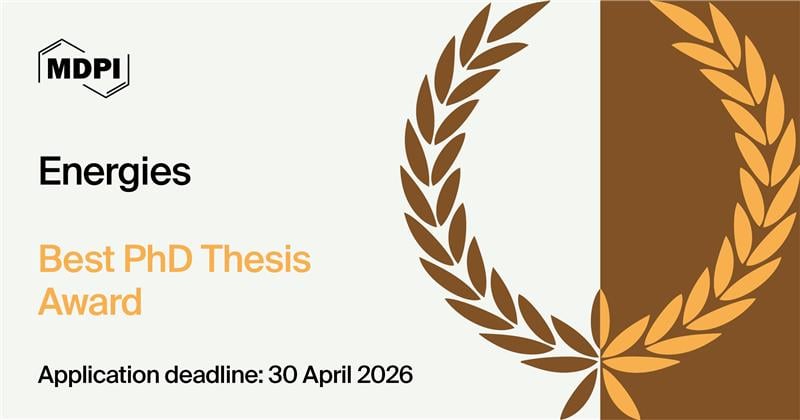
The journal Energies (ISSN: 1996-1073) is accepting applications for the Energies 2025 PhD Thesis Award. This prize will be awarded to a PhD student or recently qualified PhD fellow who has produced a highly anticipated thesis with great academic potential.
Prize:
- CHF 500;
- A certificate;
- An Article Processing Charge (APC) waiver voucher for one submission to the journal (subject to peer review)—valid for one year.
Number of Winners: 2.
To find out more information about the award and how to nominate candidates, please click here. To request further information, please contact the Energies Editorial Office.
Energies Editorial Office
8 September 2025
MDPI Webinar | International Day of Clean Air for Blue Skies, 8 September 2025

MDPI is launching a special webinar to commemorate the International Day of Clean Air for Blue Skies (IDCABS) and encourage researchers to share their knowledge to raise awareness about the dangers of air pollution.
Air pollution is the leading environmental threat to human health, causing millions of premature deaths each year. In order to recognise its global impact, the UN has designated 7th of September as the International Day of Clean Air for Blue Skies to highlight the need for urgent action towards a sustainable future.
Date: 9 September 2025 at 12:00 p.m. CEST | 6:00 p.m. CST Asia
Webinar ID: 891 7022 7572
Register now for free!
Program
| Speaker/Presentation | Time in CEST | Time in CST (Asia) |
| MDPI Introduction | 12:00–12:10 p.m. | 6:00–6:10 p.m. |
| Dr. Linda Walters Atmospheric Deposition of Microplastics and other Anthropogenic Materials |
12:10–12:30 p.m. | 6:10–6:30 p.m. |
| Dr. Suraj Bhagat How AI/ML is Shaping the Fight Against Air Pollution for Better Public Health |
12:30–12:50 p.m. | 6:30–6:50 p.m. |
| Prof. Umberto Berardi Mechanical Ventilation and Air Pollution |
12:50–1:10 p.m. | 6:50–7:10 p.m. |
| Q&A Session | 1:10–1:30 p.m. | 7:10–7:30 p.m. |
| Closing of Webinar | 1:30–1:35 p.m. | 7:30–7:35 p.m. |
After registering, you will receive a confirmation email containing information on how to join the webinar. Registrations with academic institutional email addresses will be prioritized.
Unable to attend? Register anyway, and we will let you know when the recording is available to watch.
Webinar Chairs and Keynote Speakers:
- Dr. Suraj Bhagat, Marwadi University, India;
- Prof. Umberto Berardi, Politecnico di Bari, Italy;
- Dr. Linda Walters, University of Central Florida, USA.
Relevant Special Issues:
“Air Pollution: Health Risks and Mitigation Strategies”
Guest Editors: Dr. Gabriele Donzelli and Prof. Dr. María M. Morales Suárez-Varela
Deadline for manuscript submissions: 30 November 2025
Submit to Atmosphere
“Bio-Energy: Biogas, Biomethane and Green-Hydrogen”
Guest Editor: Prof. Dr. João Fernando Pereira Gomes
Deadline for manuscript submissions: 30 November 2025
Submit to Gases
“Air Quality in Indoor Environments, 3rd Edition”
Guest Editors: Dr. Ana Monteiro, Prof. Dr. Carla Viegas, Dr. Sandra Cabo Verde and Dr. Marina Almeida-Silva
Deadline for manuscript submissions: 10 January 2026
Submit to Applied Sciences
“The Impact of Wildfires on Climate, Air Quality, and Human Health”
Guest Editors: Dr. Diogo Lopes and Dr. Estela Vicente
Deadline for manuscript submissions: 30 April 2026
Submit to Fire
“Air Pollution Exposure and Its Impact on Human Health”
Guest Editor: Dr. Nedim Durmus
Deadline for manuscript submissions: 1 July 2026
Submit to Air
Relevant feature papers:
“Mitigating Built Environment Air Pollution by Green Systems: An In-Depth Review”
by Serena Vitaliano, Stefano Cascone and Provvidenza Rita D’Urso
Appl. Sci. 2024, 14(15), 6487; https://doi.org/10.3390/app14156487
“Methanol, a Plugin Marine Fuel for Green House Gas Reduction—A Review”
by Dimitrios Parris, Konstantinos Spinthiropoulos, Konstantina Ragazou, Anna Giovou and Constantinos Tsanaktsidis
Energies 2024, 17(3), 605; https://doi.org/10.3390/en17030605
“Determination of Ozone Concentration Levels in Urban Environments Using a Laser Spectroscopy System”
by Mioara Petrus, Cristina Popa and Ana-Maria Bratu
Environments 2024, 11(1), 9; https://doi.org/10.3390/environments11010009
“Review of Satellite Remote Sensing of Carbon Dioxide Inversion and Assimilation”
by Kai Hu, Xinyan Feng, Qi Zhang, Pengfei Shao, Ziran Liu, Yao Xu, Shiqian Wang, Yuanyuan Wang, Han Wang, Li Di and Min Xia
Remote Sens. 2024, 16(18), 3394; https://doi.org/10.3390/rs16183394
“An Overview of Waste-to-Energy Incineration Integrated with Carbon Capture Utilization or Storage Retrofit Application”
by Michele Bertone, Luca Stabile and Giorgio Buonanno
Sustainability 2024, 16(10), 4117; https://doi.org/10.3390/su16104117
4 September 2025
Energies Editor of Distinction Award—Winners Announced
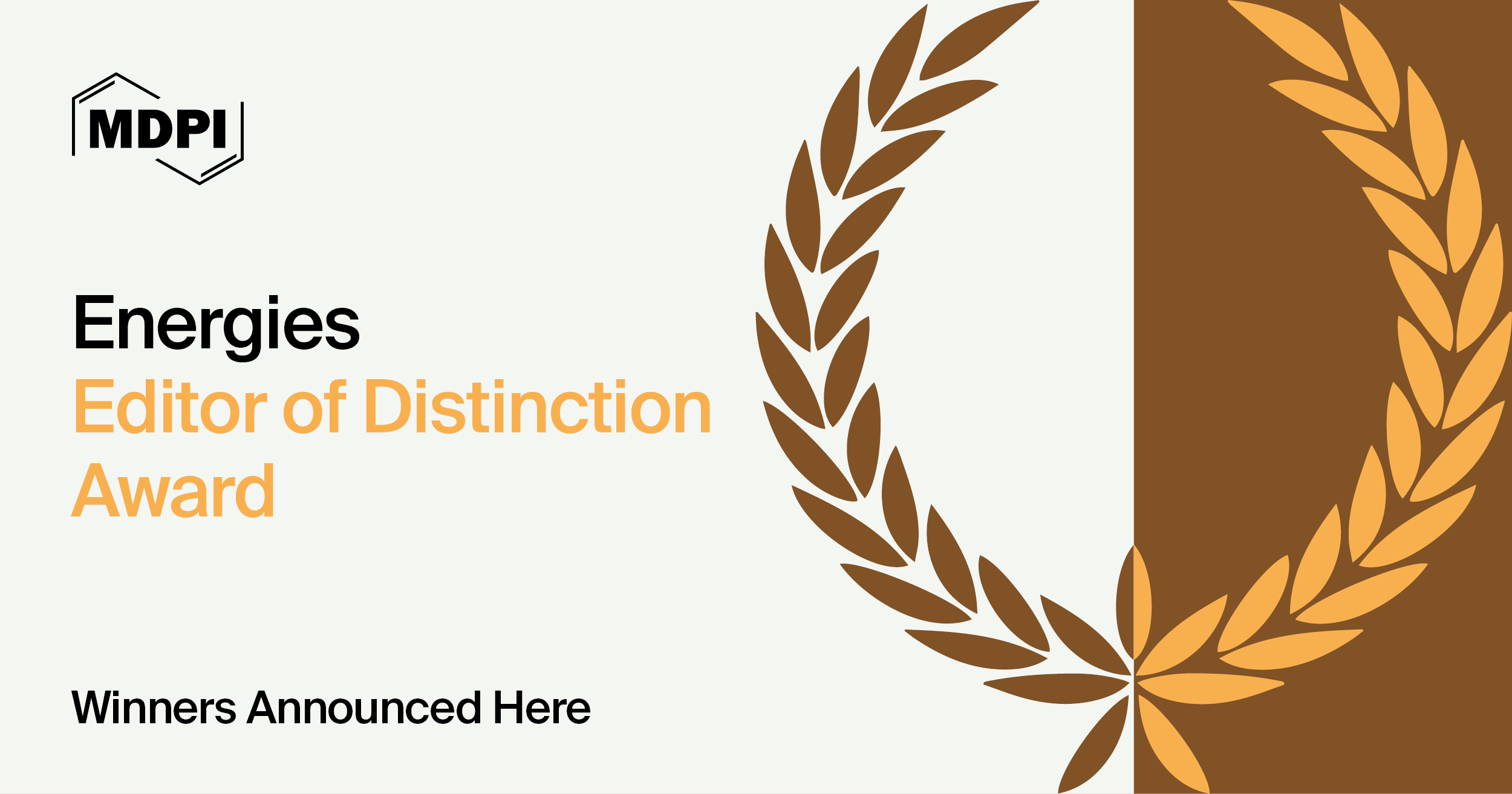
The editorial team of Energies (ISSN: 1996-1073) would like to congratulate the winners of the Energies 2024 Editor of Distinction Award, who were chosen by a selection committee chaired by the Editor-in-Chief, Prof. Dr. Enrico Sciubba. Following a formal review process by the Award Evaluation Committee, six Editorial Board Members were selected as winners. The recipients are as follows:
|
|
Name: Prof. Dr. Anastassios M. Stamatelos |
|
|
Name: Prof. Dr. David Borge-Diez |
|
|
Name: Prof. Dr. Francesco Calise |
|
|
Name: Prof. Dr. Sergio Ulgiati |
|
|
Name: Prof. Dr. Constantine D. Rakopoulos |
|
|
Name: Prof. Dr. Mofazzal Hossain |
3 September 2025
Join Us at the MDPI at the University of Toronto Career Fair, 23 September 2025, Toronto, ON, Canada

Date: 23 September 2025
Time: 11:00 a.m.–4:30 p.m
Location: The Chelsea Hotel, 33 Gerrard Street West, Toronto
MDPI is thrilled to announce our participation in the University of Toronto’s largest career fair, taking place at the St. George Downtown Campus. This exciting event brings together thousands of students, graduates, and professionals looking to connect with top employers and explore career opportunities.
We invite all attendees to visit the MDPI booth to discover how you can be part of one of the world’s leading open access academic publishers. Whether you are passionate about scientific research, editorial work, marketing, or supporting global innovation in publishing, we want to meet YOU!
What to expect at our booth:
- Learn more about MDPI’s mission and global impact;
- Explore exciting career opportunities in publishing, editorial, communications, and more;
- Network with our team and ask questions about working at MDPI.
Whether you’re just starting your career or looking to take the next step, don’t miss this opportunity to connect with MDPI. Bring your resume, your curiosity, and your questions—we look forward to seeing you there!
For additional information on the Career Fair and Open MDPI positions, please visit the following links:
2 September 2025
MDPI World Architecture Day Webinar 2025—“Architecture Design for Strength”, 6 October 2025
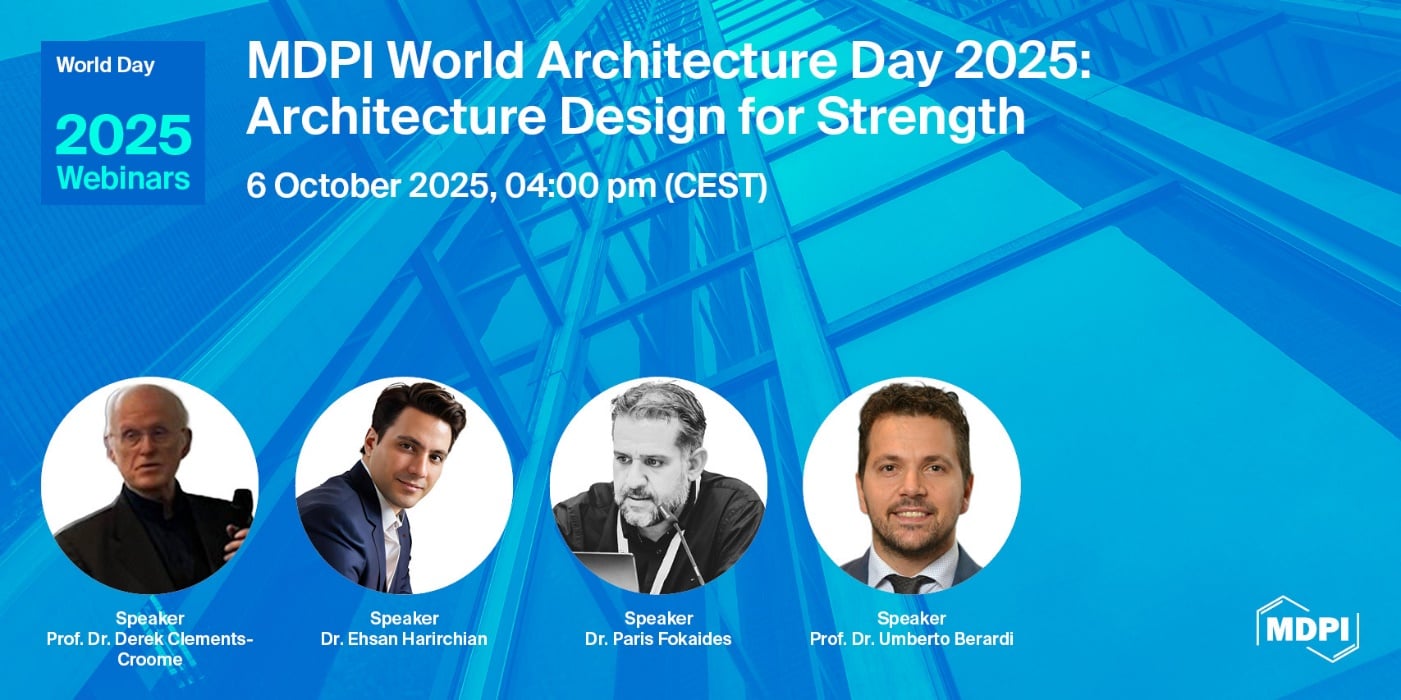
In celebration of World Architecture Day, MDPI is presenting a webinar, which is open to all who enjoy conducting any type of research on the topic of “Architecture Design for Strength” or are passionate about learning about this exciting and competitive research area. The webinar speakers will present new findings from basic to translational research. Any interesting ideas for topics and speakers for this webinar are most welcome.
Keywords: architecture design; design for strength; architecture resilience; architecture durability
Date: 6 October 2025 4:00 p.m. CEST | 10:00 a.m. EDT | 10:00 p.m. CST Asia
Webinar ID: 874 6114 8686
Website: https://sciforum.net/event/MWAD2025
Register now for free!
Program
| Speaker/Presentation | Time in CEST | Time in EDT |
| Prof. Dr. Derek Clements-Croome Embedding Sustainability and Transforming Intelligent Livable Buildings for the 21st Century |
4:00–4:20 p.m. | 10:00–10:20 a.m. |
| Dr. Paris Fokaides Evaluating Building Smartness as a Driver for Resilient and Adaptive Architectural Design |
4:20–4:40 p.m. | 10:20–10:40 a.m. |
| Dr. Ehsan Harirchian Shaping the Future: Sustainable Architecture with Aerated Autoclaved Concrete |
4:40–5:00 p.m. | 10:40–11:00 a.m. |
| Prof. Dr. Umberto Berardi Future Building Design |
5:00–5:20 p.m. | 11:00–11:20 a.m. |
| Q&A Session | 5:20–5:50 p.m. | 11:20–11:50 a.m. |
| Closing of Webinar | 5:50–6:00 p.m. | 11:50 a.m.–12:00 p.m. |
After registering, you will receive a confirmation email on how to join the webinar. Registrations with academic institutional email addresses will be prioritized.
Unable to attend? Register anyway and we will let you know when the recording is available to view.
Webinar Keynote Speakers:
- Prof. Dr. Derek Clements-Croome, University of Reading, UK;
- Dr. Paris Fokaides, Frederick University, Cyprus;
- Dr. Ehsan Harirchian, Bauhaus-Universität Weimar, Germany;
- Prof. Dr. Umberto Berardi, the International Association of Building Physics, Canada.












